Donald Trump
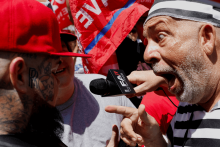
But while we disobey unjust laws to obey the moral laws we have been given by God, there’s a flip side: When human laws do serve the common good or restrain evil, we should obey them.
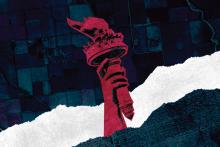
WHEN WE LOOK at the record numbers of migrants who are seeking refuge and asylum in the U.S. and the deplorable ways they have often been treated, it’s easy to lose faith. The U.S. immigration system seems so hopelessly broken, and hateful rhetoric and bad faith are so abundant among our politicians, that it can often feel as if there’s nothing we can do to fix it. Yet, if we take seriously both the Hebrew scripture command to welcome the stranger and Jesus’ call to treat migrant people as we would treat him (Matthew 25), then we cannot let ourselves succumb to despair or resignation. People who have been forced to leave dangerous conditions in their home countries to seek asylum are depending on us to not give up fighting for a fairer and more humane immigration and asylum system. Sadly, Congress has lacked sufficient political will to pass the sweeping overhaul of our immigration laws that is so sorely needed.
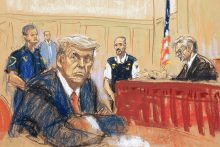
On Maundy Thursday of Holy Week, we remember how Jesus and his disciples celebrated the Passover meal, transforming it into what we now celebrate as communion. The word “maundy” originates in the Latin mandatum, in reference to the mandate Jesus gives his disciples that night: “A new commandment I give unto you that you love one another” (John 13:34). Just before the meal, Jesus engages in an act of loving service and humility: washing the disciple’s feet.
This selfless act contrasts sharply with the shameful spectacle that has dominated recent news: the indictment and arraignment of former President Donald Trump.
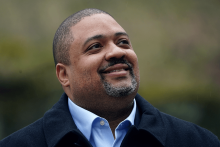
Manhattan’s District Attorney, Alvin Bragg, is best known these days for leading the probe of whether former president Donald Trump and his company broke state laws in 2016 to buy Stormy Daniels’ silence about an alleged affair.
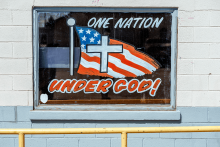
Ever since Jan. 6, 2021, the term “Christian nationalism” has proliferated in discourse, but the precise definition is up for debate. Is Christian nationalism only applicable to those who welcome the label, like Georgia Republican Rep. Marjorie Taylor Greene, who sells “Proud Christian nationalist” t-shirts, and Southern Baptist Theological Seminary president Al Mohler, who said he wasn’t going to run from Christian nationalism on a recent podcast episode? Or can it be applied to hanging images of Jesus in congressional offices and the post-rapture book and movie series Left Behind?
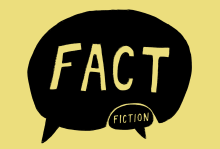
ON A SUNDAY afternoon this winter, I sat listening to some classic bossa nova playing over a streaming service called Tidal. That last detail is important only because I spent the previous morning switching from Spotify, the dominant music streaming service, in what may be the single least effective moral statement of my life (though there are other contenders to that crown). But sometimes you just have to stand up for reality.
The Spotify kerfuffle began, as you’ve probably heard, when it reportedly made a $200 million deal with Joe Rogan for the right to broadcast his podcast, a remarkably long and tendentious series of rants that included his advice that 20-somethings should not be vaccinated against the coronavirus (as well as repeated use of racist language). Rogan also had as a guest on his show the remarkably underwhelming Canadian philosophe Jordan Peterson who explained, incoherently, why the models that physicists have built to model the earth’s climate couldn’t possibly work. In response to Rogan’s anti-vax rant, Neil Young and Joni Mitchell—generational icons if ever there were—pulled their music from the streaming service and others have done the same. They were met with criticism from Roganers who called this an attempt at censorship and accused them of betraying their ’60s-era anti-establishment credentials.
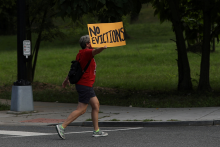
Housing rights advocates, community leaders, and faith-based organizations across the country are scrambling to provide resources and funding to thousands at risk of losing their housing when the federal eviction moratorium ends on Aug. 1.
The moratorium was first put in place in September of 2020, by the Centers for Disease Control and Prevention. It was previously extended under both then-President Donald Trump and President Joe Biden. So far, the CDC has not signaled that it will extend the moratorium again, though Democrats in Congress have petitioned to have it extended.
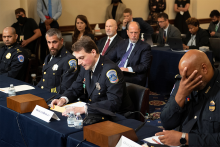
In an emotional congressional hearing Tuesday morning, witnesses of the Jan. 6 insurrection on Capitol Hill used multiple words to describe those who attacked them: One was “terrorists;” another was “Christians.”
“It was clear the terrorists perceived themselves to be Christians,” Metropolitan police officer Daniel Hodges stated in his testimony, which graphically described the physical attacks on Hodges and other officers.
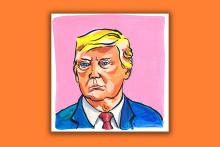
IT'S UNLIKELY THAT Donald Trump is fretting over his presidential portrait. With further legal troubles and several industries turned against him, the man has bigger fish to fry. But as we’ve learned time and time again through the ravages of the coronavirus and police violence, just because Trump isn’t worried about something doesn’t mean it doesn’t matter. The unconfirmed, though expected, portrait offers a chance for him to shape a legacy that is in dire need of salvaging. Trump’s painting could serve to underscore—or attempt to elide—the unconventional nature of his time in office, potentially adding a glossy filter to a difficult period in American history. Of course, filtering is more than part and parcel of portraiture. It’s the very nature of the job.
Throughout the centuries, portraiture has been the province of the wealthy and, despite its biographical nature, is a genre that conceals nearly as much as it reveals. Louis XIV, another larger-than-life leader, exhibits this multiplicity of meaning all too well in his portraits. Painter Charles Poerson clothes Louis XIV in the garb of Jupiter—complete with lightning bolts in hand—to signify his victory over a series of nobility uprisings known as the Fronde. By shrouding the king’s humanity, Poerson makes Louis into someone divine, armed with greater might than mere mortals. Who needs the imago dei when you can simply be God? A different portrait replaces the gouty king’s legs with the calves of a younger man. In short, the sovereign portrait is synonymous with a kind of psychological trompe l’oeil, created to preserve power and project glory. American presidential portraits differ in their ends, though they are invested in other kinds of self-delusion: equality and equanimity.
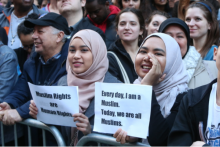
For Muslim religious and political leaders, President Joe Biden’s inauguration ends the “nightmare” of the Trump administration; nevertheless, Muslim leaders remained cautious in expressing optimism about the Biden administration’s promises.

In the early morning of Jan. 13, following a day of attempted legal delays and despite documentation of severe mental illness stemming from childhood abuse, 52-year-old Lisa Montgomery became the first woman in decades to be executed by the federal government.

As faith leaders, we must call for the immediate removal of Donald Trump from office. There is great danger in the hands of a morally deranged president: the threat of martial law, his ongoing efforts to overturn a free and fair election, the potential of politically conceived war, and the unique danger of his destructive hands on the nuclear codes.
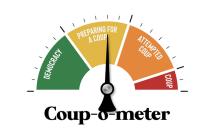
Even before ballots were cast in the 2020 presidential election, many were suspicious of how the Trump White House would handle a potential transfer of power. As the election wound down with clear margins in President-elect Joe Biden’s favor — and as Donald Trump continued his refusal to concede — more people began to use the word “coup.”
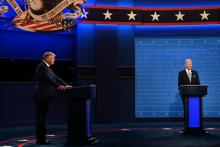
In the 2020 election cycle, most of the Democratic primary candidates provided videos, including Vice President Joe Biden. The Christian leaders in the Circle of Protection have asked for a video and/or statement on poverty policy from President Trump, but his campaign has not responded to repeated requests.
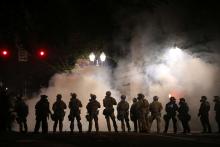
“As a community, we will resist such unconstitutional action by any morally rooted means we deem necessary,” said Rev. Dr. Otis Moss III. “We are a city of grit, grind and resistance, unafraid to speak truth to power.”

WHITE CHRISTIAN VOTERS —evangelicals, but also Catholics—pushed Trump over the finish line in the 2016 election. Trump regularly holds court in the media with evangelicals but has been less overt with Catholics. That is until January, when he favored some with a personal appearance at the annual March for Life on the national Mall, held in protest of the 1973 Supreme Court decision that overturned state bans on abortion.
“Catholics were of secondary importance to the Trump campaign in 2016, behind evangelicals. That hasn’t changed, but there is at least an effort to reach this community now,” former Rep. Tim Huelskamp (R-Kan.) told Politico in January.
As a Catholic, I’m deeply troubled by this president. Trump stands against everything I’ve been taught to believe.
Pope Francis has prioritized the climate crisis for Catholics; Trump withdrew from the Paris accords and dismantled the modest advances made under Obama.
Pope Francis says welcoming migrants builds a strong social ethic; Trump implements policies that tear apart families and imprison migrant children.
Catholics believe in promoting a consistent moral stance that allows life to flourish. Under the Trump administration average life expectancy in the U.S. has been on the decline for three consecutive years (representing the longest consecutive decline in the American lifespan since World War I).
Pope Francis teaches that the death penalty is no longer permissible under any circumstance; Trump’s attorney general reinstated the federal death penalty, executing prisoners for the first time in nearly two decades.

I did not attend the National Prayer Breakfast this morning, though I have done so in the past. The longtime Washington tradition brings together members of Congress from both political parties along with thousands of faith leaders, and every president since Dwight D. Eisenhower has attended. But this is not a time in our nation for habitual or vague prayers for an audience, given the moral and political crisis we now find ourselves in — or one that starts with the president of the United States holding up a newspaper headline saying “Acquitted,” and quickly invoking an impeachment process corrupted by partisan politics.
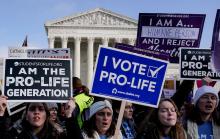
On Friday, President Donald Trump prepared to be the first U.S. president to attend the March for Life, the annual gathering of anti-abortion activists and faith groups in Washington, D.C., just after Vice President Mike Pence met with Pope Francis during an unusually long audience at the Vatican.
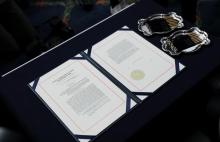
Two years ago, Sojourners magazine released our February 2018 cover story, asking the question, “Is This a Bonhoeffer Moment?” This week, the board of directors of the International Bonhoeffer Society — an organization dedicated to research and scholarship on the life and writings of Dietrich Bonhoeffer — issued an answer from their discernment.

We can respect a diversity of Christian opinion around whether impeachment is the necessary and only remedy to the president’s actions and whether the president’s offenses rise to the constitutional level of "Treason, Bribery, or other high Crimes and Misdemeanors.” But what I can’t understand or respect are direct efforts to subvert the truth, deflect attention, and defend the indefensible.